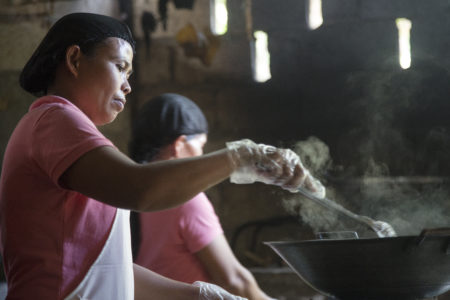
In this famous optical illusion, some people see a rabbit, while others see a duck. Similarly, when it comes to new crop varieties, users see them in different ways. Farmers want higher yields while consumers want better taste. The list of perspectives is long, and even longer when you take gender differences into account.
“Men and women often have different ideas about what matters most in a crop variety depending on their relationship to it. Men are likely to value it in terms of market-related traits like yield or shelf-life while women are likely to look for food security traits such as early maturity or taste. They will also consider practical qualities which affect them like the ease of processing, a role which falls heavily on women,” says Vivian Polar, Gender and Innovation Senior Specialist, International Potato Center (CIP).
Mind the gender yield gap
For too many years, these gender differences have been neglected when it comes to breeding better potato and sweetpotato varieties.
“Women tend to be responsible for food preparation, and thus have more detailed knowledge about what a good variety should bring to the table,” said Eva Weltzien of the University of Wisconsin. “If women cannot prepare more food … produced by a higher-yielding variety… they will not adopt the new variety and will discourage the men from doing so.”
For reasons like this, researchers at CIP have learned that building women’s preferences into product design from the start of breeding programs is a gender equity and economic necessity. Here’s why: Women produce more than half the food grown globally. If women had the same access to productive resources as men, they could increase yields by 20-30%, which would be a 4% increase of the total agricultural output of developing countries.
Putting the G+ tools to the test

The G+ Tools are designed to help plant breeders and social scientists work together so that programs integrate gender issues from breeding to implementation and impact assessment. The G+ Customer Profile Tool identifies customers for a new or existing variety by taking gender and other social differences into account. The G+ Product Profile Query Tool looks at how traits can benefit or negatively impact the women or men who will use a particular variety. For example, a higher-yielding variety favored by men for its market qualities may be rejected by women if it has a long cooking time, especially as women are often disproportionately tasked with gathering firewood and other domestic chores.
Within the last year, G+ Tools have been deployed for use with banana, cassava, potato, and sweetpotato breeding programs around the world.
In Uganda, breeders are using an array of data for sweetpotato variety selection including surveys, field trials, and market analysis.
“While survey data help us understand which traits different groups prefer, the G+ Tools have taught us to analyze if and how a new variety might require more labor on the farm and how that might affect men and women differently,” says CIP research associate Sarah Mayanja.
In Nigeria, the adoption rate of new varieties of cassava by women farmers is relatively low when compared to male counterparts. “Value chain analysis reveals that women carry out almost all of the processing work, so new varieties must be easy to process, or they simply won’t adopt them,” says Bela Teeken, Associate Social and Gender Scientist, the International Institute of Tropical Agriculture. “This means we can now take this into account in targeted breeding approaches to increase uptake of improved varieties by women.”
Gender equality in a healthy world
The CGIAR 2030 Research and Innovation Strategy pledges to close the gender gap in access to economic resources, ownership, and control over land and natural resources for over 500 million women who work in food, land, and water systems.
In support of this objective, the G+ Tools are just one of several “golden eggs” delivered by the CGIAR Research Program on Roots, Tubers, and Bananas, which will be folded into the One CGIAR later this year. Collectively, these tools will drive this important mission for gender equity – and help breeding programs see both the rabbit and the duck when it comes to producing better varieties for everyone.
Find out more about the G+ Tools
The G+ Tools have been developed by the CGIAR Gender and Breeding Initiative, which is part of the CGIAR Research Program on Roots, Tubers and Bananas, led by CIP. They are being jointly piloted with the CGIAR Excellence in Breeding Platform (EiB) on a selected set of breeding programs including banana, cassava, potato, and sweetpotato breeding programs and are regarded as part of the ‘Golden Egg’ collective assets that will drive forward the One CGIAR’s mission to transform food, land, and water systems in a climate crisis.
Article written by Samantha Collins - Communications Consultant
